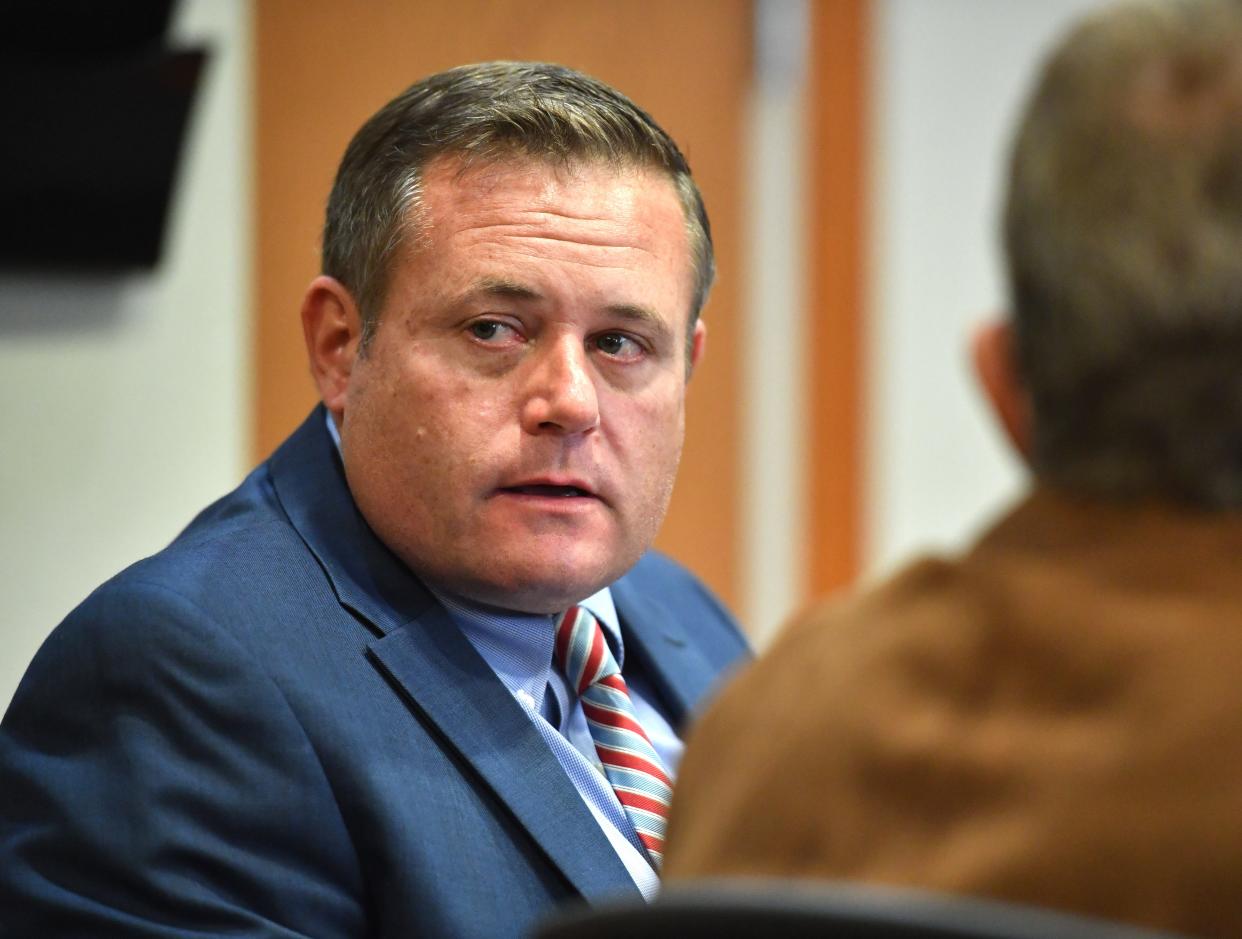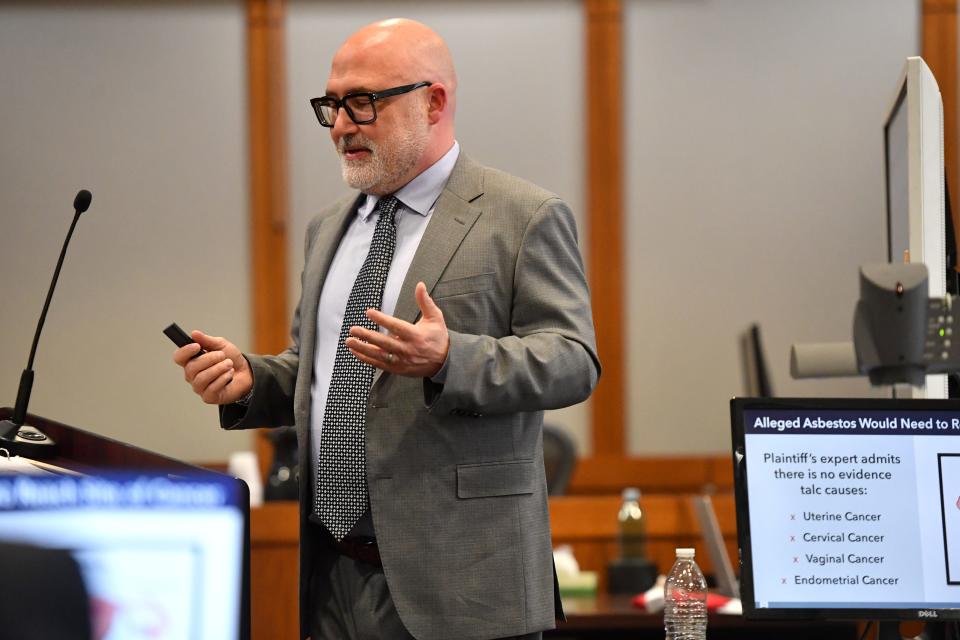Johnson & Johnson baby powder trial: Sarasota woman testifies 'life has been a nightmare'

Patricia Matthey appeared before a Sarasota jury in circuit court late Wednesday afternoon, displaying in front of her various medical supplies — intravenous tubing, needles, a colostomy bag, vials with potassium — all items she explained she needed to have with her to survive for 48 hours.
“It’s made my life a total nightmare," the Sarasota County woman said. "Since the day I was diagnosed with ovarian cancer, my life has been a nightmare."
Her husband, Bernard Matthey, and her son, Philippe Matthey, both sat at the plaintiff's table, staring intently at her face. Bernard Matthey clasped his hands, pressing them up to his mouth for most of the testimony.
More: Sarasota jury hears opening statements in wrongful death trial against Johnson & Johnson
Previously: Trial against Johnson & Johnson: Expert testifies to what was found in baby powder
Pat Matthey died in November 2019 after she was diagnosed with ovarian cancer in August 2016. She appeared in court through a taped video deposition taken on Dec. 20, 2018, knowing that her health was fragile.
“Well, obviously I haven't seen Pat since she passed away, and seeing her sick reminded me so much of the suffering that we went through,” Bernard Matthey said during his testimony Thursday morning. “It’s really moving to me to think about how difficult it was.”
Philippe Matthey, on behalf of his mother’s estate, is suing Johnson & Johnson for product liability and wrongful death. The complaint alleges that Pat Matthey's cancer was linked to the talc-based baby powder produced by Johnson & Johnson which she had used for more than 50 years.
Over the decades, there have been varied opinions from scientists, researchers and government agencies about whether talc-based powders increased the risk of ovarian cancer in women.
Talcum, or talc, is a soft, naturally occurring mineral mainly made up of magnesium, silicon and oxygen, and is often found in mines with asbestos.
Sarasota jurors hear Pat and Bernard Matthey's love story, struggle with ovarian cancer
On her 72nd birthday, Pat Matthey was sitting up in her hospital bed and smiling at her loved ones.
“I had not seen her like that for months,” Bernard Matthey said in court Thursday about his wife.
Pat Matthey had wanted to spend her birthday laughing and having a good time with her family, Bernard Matthey testified.
The next day, her health took a turn for the worse. After speaking privately with Pat Matthey, doctors informed Bernard that his wife had chosen to not continue with treatment.
Bernard Matthey sat by his wife’s hospital bed as she lay unconscious and read the birthday cards she’d received because he’d heard that unconscious patients could still hear people talking to them. When he was done, he kissed his wife’s head one last time before she died, he said, pausing as he teared up.
“I loved her very, very much and I still love her,” Bernard Matthey told the jury.
The two had met on a rainy Sunday afternoon at a bar in New York City, and a few years later in 1975, they married and started their family. They spent time living in the U.S. and Switzerland, Bernard Matthey’s native country, enjoying an active lifestyle of taking long walks, hiking, snorkeling and dancing until Pat Matthey became sick.
Pat Matthey said she'd been unaware about the risks of the talc-based baby powder until her daughter-in-law stopped her from using the product on her granddaughter after changing her diaper.
She testified that she began to occasionally use the product when she was about 12 years old, then started to use it daily, sometimes multiple times a day, starting when she was 18 years old, because of advertisements she'd seen.
The advertisements, Pat Matthey recalled, were aimed at young women, telling them that to be "clean and fresh" they needed to use the powder daily. Being vulnerable at that age, Pat Matthey said she didn't want to have the natural body odors because she thought they were "dirty, smelly."
In 2019: Johnson & Johnson recalls baby powder after discovering small amounts of asbestos
Keep reading: Johnson & Johnson to end sales of talc baby powder globally next year amid cancer lawsuits
Pat Matthey said she expected the product to be safe, and that if the advertisements and bottles had included warnings about the possible risk of ovarian cancer, it would have impacted her decision to purchase and use the powder.
Asked by a Johnson & Johnson attorney if she discontinued using baby powder after her daughter-in-law stopped her in 2015 from using the product on her granddaughter, Pat Matthey said she continued to use the product until her cancer diagnosis.
Bernard Matthey said his wife went through several surgeries and chemotherapy sessions. He was by his wife's side, helping her the best he could. He said he saw his wife's confidence wane, as well as her spontaneity do the activities they'd previously done together.
History expert: Johnson & Johnson consistently did not share with public information about asbestos testing, results
Lara Freidenfelds, a historian of science, pointed out that throughout Johnson & Johnson internal memos that detailed meetings with various researchers that the company's executives disagreed with their findings, the letters would include verbiage that made it sound as if the scientists admitted to flaws or weaknesses in their studies.
Freidenfelds said she also observed a pattern that if there was a researcher who published results of asbestos being found in the talc-based baby powder, the company would try to persuade them that they hadn't.
In one example from the mid-1970s, Dr. Arthur Langer, a mineralogist and Mount Sinai researcher, had found trace amounts of chrysotile asbestos, commonly known as white asbestos, in samples of off-the-shelf baby powders, including Johnson & Johnson's Baby Powder. Freidenfelds told the jury that Langer was expected to share his results at a conference he was attending, and that the written manuscript would be shared among conference attendees prior to his presentation.
A Johnson & Johnson's research consultant was sent to convince Langer and his team to pull the manuscript from distribution, so those who were going to learn about the results wouldn't get a printed copy, Freidenfelds said. The consultant was successful, the manuscript was pulled, and the lead scientist was convinced to go back and test the powders again.
“This is shocking," Freidenfelds said. "If this happened at my conference and people found out, it would be quite a scene.”
While subsequent tests of Johnson & Johnson's baby powders didn't find asbestos, Freidenfelds said Langer has stood by his findings in recent media interviews, including in a 2018 expose by Reuters.
Johnson & Johnson consistently did not share with public about what it knew about asbestos testing and the appearance of asbestos in its talc, Freidenfelds said.
Other news: Johnson & Johnson marketed baby powder to Black women amid cancer concerns, lawsuit says
More: Johnson & Johnson proposes to pay nearly $9 billion to settle talc powder lawsuits
Lead attorney for Johnson & Johnson, Morton Dubin, questioned Freidenfelds about her forming an opinion based on a limited review of documents believed to be largely selected by attorneys for the plaintiffs.
Dubin alluded to the fact that the database that Freidenfelds had access to contained more than 2 million documents for review, but that she had only reviewed about 2,000 of them.
He questioned also about the fact that as of February 2024, Freidenfelds hadn't reviewed an independent study performed by NIOSH and Harvard researchers that found no asbestos in samples from the Vermont mines Johnson & Johnson used to mine talcum powder for its baby powders.
Dubin also during his cross sought to show the jury a 1972 internal Johnson & Johnson letter that showed there was a 99.9% certainty that all ore produced from the Windsor mines was free from asbestos or asbestiform minerals.
Johnson & Johnson's attorneys begin presenting their defense
By late afternoon Thursday, attorneys for the Matthey family rested their case and the company's lead attorney called Dr. Gregory Diette, an epidemiologist and pulmonologist, as their first expert witness.

Diette, an attending physician at the Johns Hopkins Hospital and the Johns Hopkins Bayview Medical Center, was called to address whether talcum powder use can cause ovarian cancer, specifically reviewing studies that made the connection and pointing out the flaws.
Diette testified that epidemiology studies don't support a causal relationship between the feminine use of talc-based powders and development of ovarian cancer.
Through Diette's testimony, Dubin presented that there were inconsistencies with case control and cohort studies, that the strongest studies showed no causal link, that case control studies showed a weak association between talc powder use and ovarian cancer with no consistent "dose-response," and that the weak association is likely due to bias and confounding.
Study: No strong link between baby powder and cancer, study finds
Amid cancer lawsuits: Johnson & Johnson to end sales of talc baby powder globally next year amid cancer lawsuits
A case control study, Diette explained, takes a group of participants who have a particular condition or disease and compares them to a group that doesn't, and asks retrospective questions about exposure to a certain risk factor, for example the amount of exposure of talcum-based powders. In a cohort study, a group of participants are gathered who don't have a disease or condition yet, they review some of the factors and then the group is followed over time to see if a condition or disease will develop connected to a certain factor.
Diette said that cohort studies are the stronger of the two, because case control studies are more prone to biases, including recall bias, and confounding.
Leigh O'Dell, one of the attorneys for the Matthey family, pointed out to the jury that Diette had provided testimony in talc powder cases about 110 times, including testifying 36 times for Johnson & Johnson in talcum powder cases.
O'Dell in her questioning pointed out that there have been several studies that show that exposure to asbestos can cause inflammation and causes ovarian cancer. In one meta-analysis, it showed that exposure to asbestos was linked to a 77% increased risk of ovarian cancer fatality, O'Dell said.
When O'Dell further pushed Diette if he had reviewed reports that asbestos had been found in Johnson & Johnson's baby powder, including by the FDA, Diette said that he hadn't seen all the reports and that he didn't have the expertise to look over certain studies.
The attorney's questioning also pointed out to the jury that there is a general consensus among government agencies that there is no safe level of exposure of asbestos.
Gabriela Szymanowska covers the legal system for the Herald-Tribune in partnership with Report for America. You can support her work with a tax-deductible donation to Report for America. Contact Gabriela Szymanowska at gszymanowska@gannett.com, or on X: @GabrielaSzyman3.
This article originally appeared on Sarasota Herald-Tribune: Sarasota family testifies in Johnson & Johnson talc powder lawsuit

